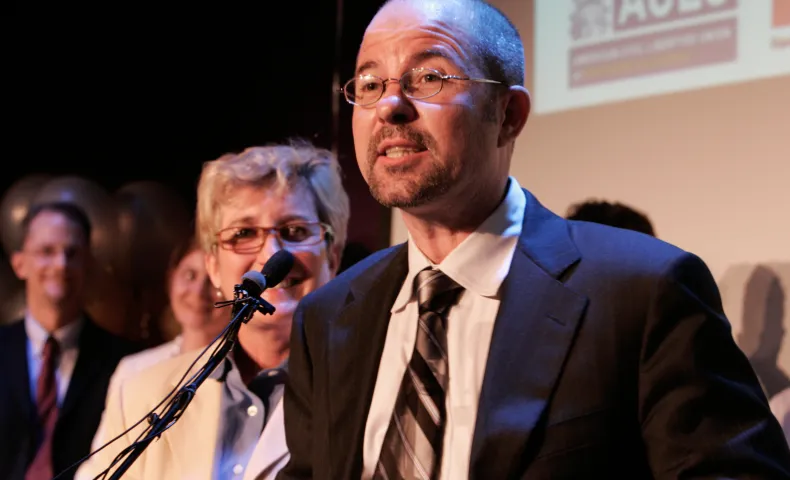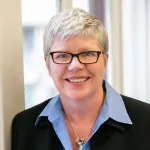 Photo credit Charlotte Fiorito
Photo credit Charlotte Fiorito
Six Questions About the Flexible Leadership Awards Program
Paula Morris is the former program director of the Haas, Jr. Fund's Flexible Leadership Awards program. She worked as a Plan Consultant with the National Center for Lesbian Rights (NCLR) and a number of the Fund's other Flexible Leadership Award grantees. In this interview, she adds some additional context to the FLA case study on NCLR.
What is the role of a Plan Consultant?
This is one of the unique elements of the Flexible Leadership Awards program. Each of the organizations in the program gets to work with a Plan Consultant who has experience helping organizations assess their strengths and challenges and plan for the future.
The Plan Consultant’s role is to help the organization and its leaders take a step back and decide how to make the most of the Haas, Jr. Fund’s leadership support. This means engaging them in strategic discussions about their priorities for the future and how to strengthen their leadership so they can get where they want to go. The Plan Consultant then stays with them and becomes their confidential thought partner on their journey to stronger leadership and better results. This partnership over time is what the organization leaders have told us they value the most.
Why did the Haas, Jr. Fund select the National Center for Lesbian Rights for a Flexible Leadership Award (FLA) grant?
The National Center for Lesbian Rights has been a Haas, Jr. Fund grantee since 1999. Over the years, NCLR has received nearly $2 million from the Fund, including leadership support. The Fund has always viewed NCLR as a very important organization in the movement for gay and lesbian rights—and its stature and role in the movement were growing when NCLR was invited to participate in the Flexible Leadership Awards program in 2005. At the time, NCLR was experiencing significant growth, with both its budget and staff expanding by a factor of five in just five years.
NCLR has been very ably led by Executive Director Kate Kendell since 1996, but the organization was experiencing an urgent need to strengthen its management and operations to meet the challenges presented by growth and its higher profile in the movement. One of the most urgent needs facing NCLR was broadening its leadership from the two-person team of Kate Kendell and Legal Director Shannon Minter. At the same time that they were trying to manage the organization’s rapid growth, Kate and Shannon also were playing an increasingly important role as leaders in the marriage equality movement. They were overstretched, and the leadership support from the Haas, Jr. Fund was an opportunity to help them and their colleagues figure out how they could ease the burden on Kate and Shannon while making NCLR stronger and more effective.
What were the organization’s priorities as it sought to strengthen its leadership?
Like a lot of other organizations in the Flexible Leadership Awards program, NCLR had a laundry list of areas they could have focused on as they tried to figure out how best to strengthen their leadership. But, in the end, they decided to look at three priorities. The first was to support Kate and Shannon to bring on, and share leadership with, other senior staff members. Second, with everything going on in the movement for gay and lesbian rights these last few years, they wanted to be more thoughtful and strategic in their decision-making and priority-setting. And third, they wanted to strengthen their fundraising and communications so their staff could be more effective in those areas.
How much funding did NCLR receive and what specific activities did the FLA funding support?
Between 2005 and 2010, NCLR received $260,000 in leadership support from the Haas, Jr. Fund. This amounted to about $50,000 per year that they could devote exclusively to consulting, coaching, training and other activities to build and strengthen their leadership.
NCLR focused on getting consulting and coaching support to achieve the organization’s leadership goals. As an example, the funds supported an experienced executive coach, Gail Ginder, who has worked closely with Kate and Shannon and the rest of the senior staff for five years now. Gail facilitated team meetings and helped them think through a range of challenges and issues. That includes everything from how to grow the staff and what to look for in new hires to what responsibilities should fall on whose shoulders. Gail also was someone they could call on in times of crisis to help the team reach consensus on how to respond effectively. Most importantly, this coaching has helped each of the staff leaders figure out how they needed to shift their leadership styles and behaviors to work together more effectively as a team.
Another example of how they used this support is in communications and fundraising. In their first year in the Flexible Leadership Awards program, NCLR conducted a communications audit to find out more about how the organization and its work were perceived among its key audiences. They also brought in an expert communications consultant who helped them use social media more effectively. And, with the coaching and consulting supported by the award, NCLR has been working to integrate their communications and fundraising with their programs and advocacy work so that the organization is sending a consistent and strong message in everything it does.
As their Plan Consultant, my role wasn’t to tell them what to do but to help them identify where they might need outside help, and to connect them with consultants and coaches and others who could provide the right kind of support at the right time.
What have been the results of this work?
The most important result is that NCLR now has a very strong senior staff team. This is an organization that used to be led entirely by just two people, and now a senior team of individuals works collaboratively to set strategy for the organization and to share the responsibilities of managing its programming and growth. That has allowed Kate and Shannon play more high-profile roles in the LGBT movement because they are not having to worry all the time about day-to-day operations at NCLR.
NCLR also has successfully ramped up its communications activities and is now the go-to organization for news and commentary on key developments in the marriage equality debate. And NCLR also has strengthened its fund development capacity and systems with the result that the organization has maintained—and grown—a strong base of funding during an economic downturn that has proved challenging for nonprofits across the country.
What are the next steps for NCLR?
The marriage equality movement is facing new opportunities and new challenges every day. Everything is moving very quickly, and NCLR is right there in the middle of it all. Looking ahead, the organization is working to make the most of its new leadership role as an advocate for LGBT rights at all levels. It’s working to strengthen its communications and to attract new resources, with a focus on social media strategies. The organization also continues to raise its profile in Washington, DC. NCLR recently hired a new attorney for federal policy. It’s also strengthening its relationships with national LGBT advocacy organizations with the goal of growing and advancing the LGBT movement.
The bottom line is there is a lot going on, and by strengthening its leadership NCLR has helped ensure that it can play an active and important part in future gains for gay and lesbian people across the country.
